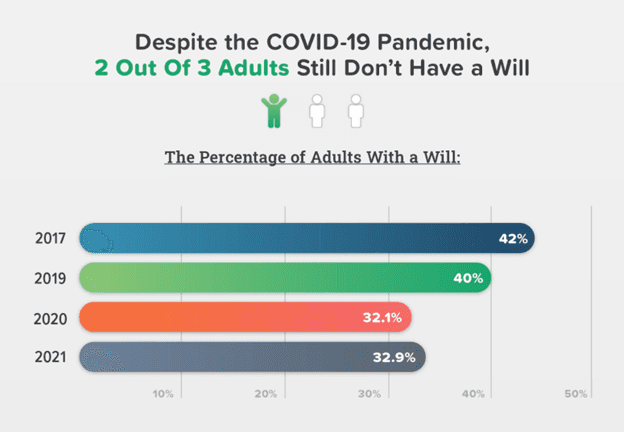Despite the COVID-19 pandemic, caring.com has found that the number of older Americans without a will remains the same. Remarkably, younger adults with a will show an increase of sixty-three percent comparative to pre-pandemic times. This 18 – 34 year old demographic is now sixteen percent more likely to have a will than those 35 – 54 years old. These younger adults typically cite COVID-19 as the impetus to start taking estate planning seriously.

Dying without a will (dying intestate) or dying with an invalid will cause logistic problems, becoming financially and emotionally draining on the loved ones you have left behind. In the absence of a will to name an executor, the state will provide a list of people eligible to fill the role. Should probate court be necessary, the court will make a selection based on this list.
Who Will Settle My Estate without a Will?
Typically, states make a surviving spouse or registered domestic partner their first choice. If there is no spouse or partner, then adult children usually follow next on that priority list, then parents or other closest family members related by blood. Further next of kin includes grandparents, grandchildren, aunts and uncles, nieces, and nephews.
There are rare instances where the state can find no next of kin. In this instance, your assets will wind up in the state's coffers. Suppose your heirs are more distant next of kin. In that case, they may require an affidavit notarizing them to be heirs to the estate property and further documentation requirements to transfer ownership of assets. State intestacy laws encourage reasonable efforts by probate authorities to identify heirs in the absence of a valid will or no will at all.
In all cases, without a will, there must be a petition to the court to appoint a personal representative to settle your debts, final taxes, minor guardianship of children, and distribution of your personal property. In the absence of any legal heirs, the law permits the court to appoint any legally competent person.
What Relationships Are Acceptable for Representation without a Will?
Each state has relationship qualification requirements of intestate succession that may not be as obvious as you think. For instance:
- Surviving Spouse – must have been legally married to the decedent at the time of death.
- Legal separation or pending divorce – a judge will determine whether or not the surviving member of the couple is a surviving spouse.
- Common-law marriage – Very few states recognize common-law marriages, and each state has its own sets of circumstances for approval.
- Same-sex couples – Same-sex marriage is now legal in all 50 states and has the same rights and responsibilities as all legally married couples. Same-sex registered domestic partners or civil union partners recognition is state law dependent.
- Adopted children – in all states, legally adopted children inherit from their adoptive parents in the same manner as biological children.
- Stepchildren – Most states will not include stepchildren who were never legally adopted.
- Foster children – These children will not usually inherit as foster parenting is not adoption.
- Children adopted by an unrelated family or adult – Most states recognize that placing a child up for adoption severs the legal tie between them and their birth parents. Under intestate succession laws, neither the child can inherit from the parents nor the parents from the child.
- Children adopted by a stepparent – Depending on state law, a child adopted by a stepparent may still inherit from their biological parents.
- Children born after the parent's death – Any child conceived before a parent's death but born after (posthumous child) inherits just as children born during the parent's life.
- Children born out of wedlock – These children always inherit from their birth mother unless an unrelated family adopts them. To inherit from the father, the child usually must show some paternal proof.
Inheriting under intestate succession laws may require an heir to live a certain amount of time longer than the decedent. Depending on the state, this can be 120 hours, five days, or merely having outlived the decedent for any period of time qualifies them as an heir. If an heir dies, close relatives such as the deceased person's child may inherit all or some for what their parent would have received. Known as the "right of representation," these children or grandchildren may be eligible as heirs though it can be complicated to establish depending on state law.
What Could Happen to My Minor Children Without a Will?
If you have minor children having a valid will allow you to name a personal guardian(s). In the absence of a will, a judge will have to appoint an interim guardian until enough information about the situation is gathered to determine the best decision for the welfare of the children.
Depending on your circumstances, a will can be a straightforward document that removes the onus on your surviving loved ones to handle your responsibilities. If you have minor children or substantial assets, your will may be part of a larger estate plan.
Don’t let the state decide who inherits your money and your property. We would be happy to help you figure out a plan that works for you. Please contact our office at (225) 283-1374 today and schedule an appointment to discuss how we can help you with your legal matters.

